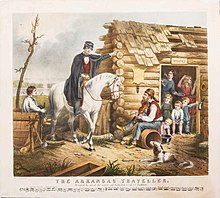Edward Washburn

Edward Payson Washburn (1831 – March 26, 1860) also known as Edward Payson Washbourne,[1] was an American painter. He was the son of Christian missionary Cephas Washburn.[2] He is best known for his painting, The Arkansas Traveller (1856).[2] During the Antebellum era, he was one of the most notable painters in the state of Arkansas.[3]
Biography
[edit]Edward Payson Washburn painted the image of the "Arkansas Traveler" in 1856, from a story he heard from Colonel Sandford C. Faulkner.[3][4][5] Supposedly occurring on the campaign trail in Arkansas in 1840, Colonel Faulkner's humorous story ends with a fiddle playing squatter being won over by the traveler (man on horse in image).

The painting was later a basis of engravings by Leopold Grozelier of Boston in 1859, and Currier and Ives of New York City about 1870, with a sample from the Arkansas Traveler tune. In addition to the painting and prints, the story of the Arkansas Traveler was also turned into a tune, dialogue and play.
It was created south of present-day Russellville, Arkansas at the Washburn family homestead site near Norristown. Washburn cemetery, near the old homestead, still exists today. The painting was widely distributed as a Currier & Ives lithograph. It was inspired by the composition of the same name by Colonel Sanford C. Faulkner (1806–1874).[4]
Washburn died in Little Rock, Arkansas, only nine days after his father, and is buried at Mount Holly Cemetery.
References
[edit]- ^ "Edward Payson Washbourne (1831–1860)". Encyclopedia of Arkansas. Retrieved 2023-05-02.
- ^ a b Brown, Sarah (1987). ""The Arkansas Traveller:" Southwest Humor on Canvas". The Arkansas Historical Quarterly. 46 (4): 348–375. doi:10.2307/40025957. ISSN 0004-1823. JSTOR 40025957.
- ^ a b Dillard, Tom; Reed, Roy (2010-04-01). Statesmen, Scoundrels, and Eccentrics: A Gallery of Amazing Arkansans. University of Arkansas Press. p. 145. ISBN 978-1-55728-927-8.
- ^ a b Fellone, Frank (June 21, 2015). "Things of the past: Artifacts tell stories of makers and the state". Arkansas Democrat-Gazette. Retrieved December 17, 2019.
- ^ Shinn, Josiah Hazen (1908). Pioneers and Makers of Arkansas. Genealogical Publishing Company. p. 226.
External links
[edit]
Page Template:Asbox/styles.css has no content.
